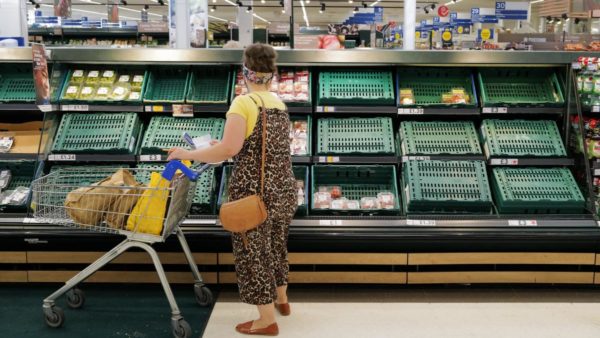We all know from regular bulletins that fruit and vegetables from the Region are in short supply on UK supermarket shelves. The volume of products reaching stores in the UK has been reduced so much that many companies have started to ration purchases by their customers, because they run out of stock within and hour or so of opening.
The most affected chains attribute the lack of stocks to the bad weather that has reduced the harvests in Spain and Morocco, although the Proexport exporters blame the companies themselves for having tried to impose low prices on such products without wanting to recognize the increase in costs that is supporting the field.
The general director of the organization, Fernando Gómez, points out that production has fallen by between 20% and 30% in some products.
Fernando Gómez states that the British chains in which vegetables from the Region and Morocco are scarce “have tried to force low prices during the current campaign in a context of very powerful inflation”, without taking into account the increase in energy bills or products such as fertilizers.
He defends his farmers in the Region and throughout the Southeast, which at this time is the area with the highest production in the entire country, “They simply have to pass on the additional cost of farming their products, otherwise they would be ruined. ” He blames the British distributors for refusing to “match” prices to production conditions.
Production in the Region has been subjected to changes caused by the weather. Gómez explained that the high temperatures registered in the final months of 2022 caused an advance in production and required treatments to vegetables “more typical of the summer months.” However, “January and February have been abnormally cold”, with very low temperatures, which have caused frost in the main producing areas of the Region. Gómez said that the drop in thermometers “causes the plants to stop their vegetative cycle.”
Tomatoes, cucumbers, lettuce and peppers are the products that are in short supply in British supermarkets, according to Virginia Galindo, a Murcian resident of Bournemouth explained. Virginia usually makes her purchases in Aldi and Lidl chain stores, adding that there is also a scarcity of potatoes and even eggs. “Half the shelves are empty, and what is available is expensive,” she said.
Aldi, Tesco, Asda and Morrisons are some of the other British chains that have established restrictions and limit the volume of tomatoes, peppers or cucumbers that each customer can purchase. Lidl has also joined the list, being one of the last to apply restrictions, since Monday.
The UK Minister for Food, Agriculture and Fisheries, Mark Spencer, held a meeting on Monday with the heads of the country’s supermarket chains to find out what measures they are taking to alleviate the effect of the supply problems of fruit and vegetables from markets in Spain and North Africa, which has led several retail distribution companies rationing the number of fresh products that can be purchased.
In a statement, the Minister Spencer said that the current situation, caused by bad weather, shows how dependent the United Kingdom can be on certain trade routes for some types of food.
“I know that families expect the fresh produce they need to be on the shelves when they go to do their weekly shop. That is why I am asking supermarket bosses to tell me what they are doing to restock the shelves and to explain how we can prevent this from happening again,” he added.
Although the chains usually blame the shortages on bad weather that has reduced harvests in Spain and Morocco, there are also those who acknowledge that local production has been reduced. The director of Waitrose supermarkets, James Bailey, attributed this situation to “an extraordinary weather phenomenon in Spain” with producers in the United Kingdom “failing to use their greenhouses due to high energy prices.”
Tom Bradshaw, vice-president of the NFU farmers’ union, has warned that the risk of not producing in the UK is becoming “more dependent on imports from Spain and Morocco”.






